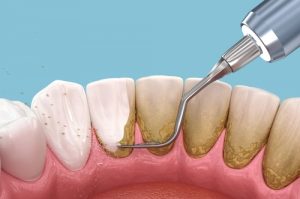The Harmful Affects of Gingivitis on Your Gums

At Perrott Dentistry, our qualified Boardman, OH dentist, Dr. Robert Perrott helps patients understand the causes, symptoms, treatment options, and preventive measures for gingivitis, as well as how our skilled team can help maintain healthy gums. To learn more about gingivitis, contact Dr. Perrott today by calling (330) 726-0090.
What is Gingivitis?
Gingivitis is the earliest stage of gum disease (also known as periodontal disease) and is primarily caused by the accumulation of plaque – a sticky film of bacteria – on your teeth. Plaque that isn’t removed with regular brushing and flossing can irritate the gum tissue, leading to inflammation and redness.
Unlike more advanced stages of gum disease, gingivitis does not cause the gums to recede or form pockets around the teeth. However, if left untreated, it can progress to periodontitis, which can cause significant damage to both the gums and the bone that supports your teeth.
Causes of Gingivitis
The primary cause of gingivitis is poor oral hygiene that encourages plaque to form on your teeth. Other factors can contribute to the development of gingivitis, including:
Poor Oral Hygiene Habits
Infrequent brushing or flossing allows plaque to build up and irritate the gum tissue. The bacteria in plaque can cause gums to become inflamed and swollen.
Smoking or Chewing Tobacco
Tobacco use is one of the most significant risk factors for gum disease, including gingivitis. Smoking or chewing tobacco weakens your immune system, making it harder for your body to fight off gum infections.
Poor Nutrition
A diet lacking in essential nutrients, particularly vitamin C, can increase your risk of developing gingivitis. Vitamin C helps maintain healthy gums, so its deficiency can make you more susceptible to gum disease.
Medical Conditions
Certain conditions such as diabetes, HIV/AIDS, and certain viral infections can affect your body’s ability to fight off infections, including those in the gums. Additionally, certain medications can cause dry mouth, which reduces the flow of saliva, leading to an increase in plaque formation.
Dental Work That Doesn’t Fit Properly or Crowded Teeth
Dental restorations, such as fillings, crowns, or braces, that don’t fit properly can make it difficult to clean your teeth and gums effectively. Similarly, misaligned or crowded teeth can also trap food and plaque, promoting gum inflammation.
Age
As you age, your risk for gingivitis increases. Older adults may experience gum recession or other dental issues that contribute to gingivitis.
Common Symptoms of Gingivitis

- Red, swollen gums
- Bleeding gums (especially when brushing or flossing)
- Bad breath (halitosis)
- Receding gums
- Tender gums
- Sensitive gums
If you notice any of these symptoms, it’s important to see your dentist as soon as possible to prevent the condition from worsening. Dr. Perrott and our skilled team at Perrott Dentistry are skilled at diagnosing gingivitis early and providing the necessary treatments to help you restore your gum health.
Diagnosing Gingivitis at Perrott Dentistry
A dentist can diagnose gingivitis during a routine checkup and cleaning. Dr. Perrott will examine your gums for signs of inflammation, swelling, and bleeding. He may also take X-rays to check for any bone loss or other complications associated with gum disease. If you notice any of the symptoms listed earlier, it’s important to schedule an appointment by calling(330) 726-0090, as soon as possible.
Treatment for Gingivitis
Luckily, gingivitis is highly treatable, and the earlier you catch it, the easier it will be to reverse the condition. Treatment options depend on the severity of the gingivitis and may include:
Professional Cleaning
A thorough cleaning by a dentist or hygienist is the most effective way to remove plaque and tartar (hardened plaque) that have built up on your teeth and gums. This process, known as scaling, involves scraping away plaque and tartar from below the gumline to promote gum healing.
Improved Oral Hygiene
Your dentist will likely recommend that you improve your daily oral hygiene routine. This includes brushing your teeth at least twice a day with fluoride toothpaste and flossing daily to remove food particles and plaque between your teeth. Using an antimicrobial mouthwash can also help reduce bacteria in your mouth.
Antibiotics
In more severe cases of gingivitis, your dentist may prescribe antibiotics to help eliminate bacteria in your mouth. This may come in the form of a mouth rinse, gel, or oral medication.
Dental Restorations
If your gingivitis is caused by poorly fitting dental work or crowded teeth, your dentist may recommend restorative procedures to correct the issue. This can help you maintain better oral hygiene and prevent plaque accumulation in hard-to-reach areas.
Follow-up Appointments
Dr. Perrott may schedule follow-up visits to monitor your gum health and ensure that the gingivitis is resolving. Regular cleanings and checkups can help prevent the condition from returning.
How to Prevent Gingivitis
The best way to prevent gingivitis is by practicing good oral hygiene habits. Here are a few tips to keep your gums healthy:
- Brush your teeth twice a day using fluoride toothpaste. Be sure to brush all surfaces of your teeth, including your tongue.
- Floss daily to remove plaque and food particles between your teeth.
- Use mouthwash to kill bacteria and freshen your breath.
- Quit smoking or using tobacco products to improve your gum health.
- Visit your dentist regularly for checkups and professional cleanings. Dr. Perrott and his team at Perrott Dentistry in Boardman, OH, offer comprehensive dental care to help prevent and treat gum disease.
- Eat a balanced diet rich in vitamins and minerals, particularly vitamin C, which is essential for healthy gums.
Frequently Asked Questions
Is gingivitis contagious?
No, gingivitis is not contagious. It’s a bacterial infection caused by the buildup of plaque on your teeth and gums, which is only created due to a lack of daily brushing and flossing.
Can I treat gingivitis at home?
While you can improve your oral hygiene habits at home, it’s important to schedule a professional dental cleaning to remove the buildup of plaque and tartar from your teeth and gums. There are hard-to-reach areas of the mouth that can’t always be cleaned with regular brushing and flossing. Regular dental visits will help you avoid developing periodontal disease.
Is gingivitis reversible?
Yes, gingivitis is reversible with proper treatment and improved oral hygiene habits. However, if left untreated, gingivitis can progress to a more serious form of gum disease called periodontitis, which can cause permanent damage to your teeth and gums.
Keep Your Gums Healthy with Dr. Perrott in Boardman, OH
Gingivitis is a common, but preventable, condition that can lead to more serious gum diseases if not treated properly. Regular brushing, flossing, and professional cleanings are essential for maintaining good oral health. If you suspect you have gingivitis or are concerned about your gum health, schedule an appointment with Dr. Robert Perrott at Perrott Dentistry by calling (330) 726-0090 to receive personalized care and advice on how to keep your gums healthy.
By taking early action and following good oral hygiene practices, you can avoid the progression of gum disease and enjoy a lifetime of healthy smiles. Remember, prevention is always better than treatment, so don’t wait—contact Perrott Dentistry today to protect your gums and overall oral health.

